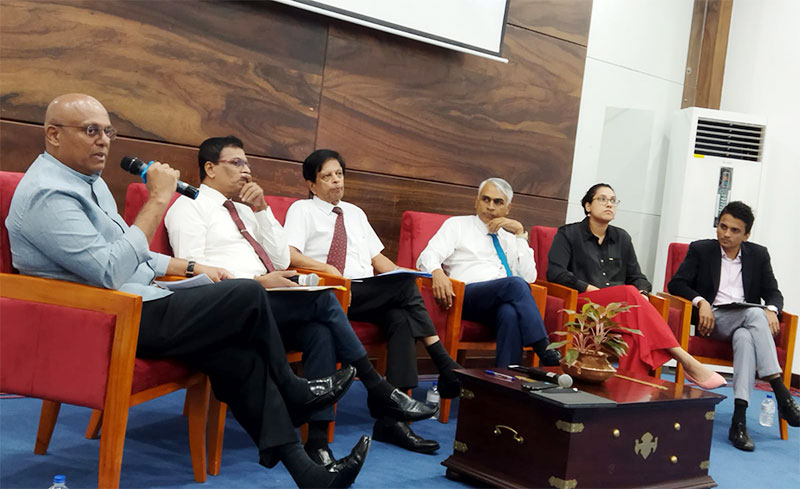BUSINESS
SOE reforms seen as bedevilled by corruption and governance issues

The panel discussion in progress
By Lynn Ockersz
The local State Owned Enterprises (SOE) reforms process is dogged by widespread corruption and governance issues. There was general agreement on this position at a wide-ranging discussion held under the aegis of the Sri Lanka Innovators’ Forum of the Dr. Gamani Corea Foundation on October 16 at the BMICH.
The prime focus of the discussion was a paper presented by the Advocata Institute, Colombo, on ‘Public Enterprise Reforms’. Key presenters for the Institute were its senior personnel Dhananath Fernando and Ms. Rehana Thowfeek. Director General, State-Owned Enterprises Restructuring Unit of the government, Suresh Shah, chaired the discussion and moderated it.
The principal panelists at the forum and some key comments made by them are as follows:
Dhananath Fernando: ‘Markets must be allowed to function. The government has no business in business enterprises. Doing SOE reforms fast and transparently is important. Profitability should not be the only consideration in this process. It is equally important to return to the country’s ownership these assets in the form of SOEs. The owners of an SOE are the citizens of the state. However, the worrisome matter is that citizens do not have a say in how an SOE is run; neither can they exit the reforms process if the SOE’s performance is unsatisfactory.’
Rehana Thowfeek: ‘A Rs. 1.8 trillion debt is owned by SOEs. However, reforming SOEs is vital for development. Corruption too is a recurring issue in SOEs. Sri Lanka’s health sector is a case in point. Privatization, though, should be seen as a priority.’
Suresh Shah: ‘The SOE restructuring process is geared to serve the wellbeing of the public and is not directed by the IMF. Listing of SOEs is vital but governance issues are getting in the way of development. The government should invest in the public sector but a prime issue is whether money is going to the right place.’
Dr. Lloyd Fernando, chairman, Dr. Gamani Corea Foundation: ‘There is a need to look at our problems holistically. The Temasek model is vital in this connection.’
Mahendra Jayasekera, Managing Director, Lanka Wall Tiles & Lanka Tiles: ‘There is this recurring problem of politicians trying to have a say in privatized enterprises. Besides, they are notorious for their double-talk. For example, they say one thing in parliament on SOE reforms and another thing to their electorates. They do not understanding the concept of return on assets. We have a serious governance problem in the country. We need to find out what benefits would accrue to the country from SOE reforms. Besides, people are skeptical about reforms being of any use.’
Chandrasena Maliyadda, Former Secretary, Ministry of Plan Implementation, Ministry of Southern Regional Development and Ministry of Posts and Telecommunications: ‘Privatization must be carried out after studying every SOE. Each SOE is different. We do not know whether the bidders for SOEs have the capability to run them, once they take them over. The Kantale Sugar Factory is a case in point. The irony is that these bidders seek government assistance to run these SOEs once they are privatized. However, the private sector, although seen as an ‘engine of growth’ is not at all effective.
‘The main issue is that our economy has been eroding. We don’t produce, there are no vibrant entrepreneurs. There is no risk-taking. What happens in privatization is that SOEs go from one set of corrupt hands to another. We should look carefully at how we are going to privatize. Privatization, though, is no panacea. All sectors are corrupt. We need to tread carefully.’
R.H.W.A. Kumarasiri, Director General, National Planning Department: ‘Do we have a system to put the right man in the right place? Are we implementing plans effectively? Good governance is important in every sector. Are all our sectors heading in one direction or are we at cross-purposes? All relevant stakeholders in development need to communicate effectively with the public on these issues. Different models are needed for different SOEs.’
